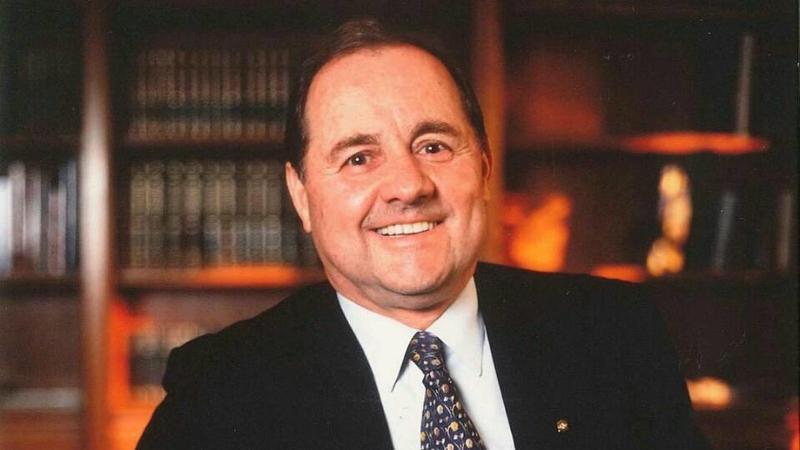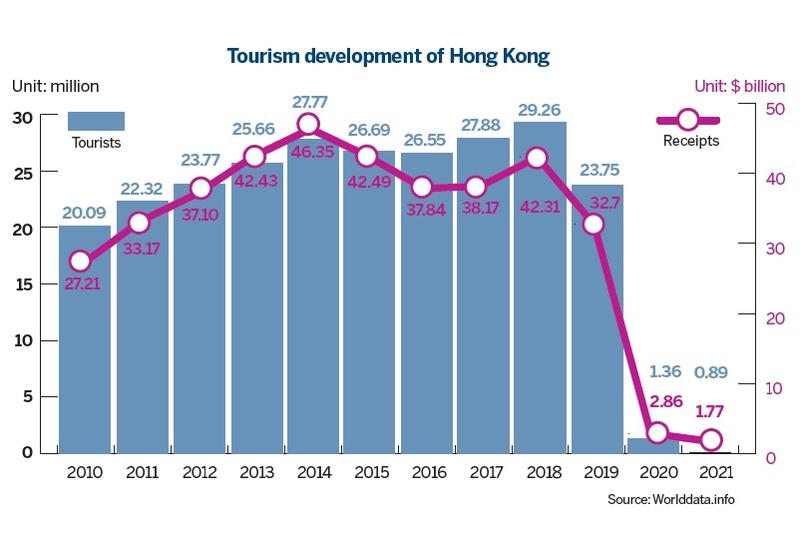 Giovanni Angelini, founder of Angelini Hospitality, emphasized the future-shaping power of vision and culture in tourism and hospitality, during a speech at the Mastermind Roundtable, hosted by China Daily Hong Kong Edition in early July. (ANDY CHONG / CHINA DAILY)
Giovanni Angelini, founder of Angelini Hospitality, emphasized the future-shaping power of vision and culture in tourism and hospitality, during a speech at the Mastermind Roundtable, hosted by China Daily Hong Kong Edition in early July. (ANDY CHONG / CHINA DAILY)
Veteran hotelier calls for city to go the extra mile to regain its tourism crown by focusing on quality, creating values and building a high culture of its own. Jessica Chen reports from Hong Kong.
Leadership is about love and vision, especially in challenging times. When Giovanni Angelini, former CEO of Shangri-La Hotels and Resorts, walked through the lobby of the Island Shangri-La Hotel at Admiralty, Hong Kong Island, to meet his friends at the coffee bar, he was greeted along the way by the hotel staff’s beaming smiles and “welcome backs”. They greeted their former boss with sincerity and reverence although he had not been at the helm for some 13 years.
Angelini, a charismatic mentor-like leader known as the “people’s hotelier”, has gained fans and followers in many countries during his 50 long years of serving in the “industry of people”. Involved in the opening of 75 new hotels in 15 different cities, he won the “Corporate Hotelier of the World” award in 2006. Now, with an unrelenting passion for success and an unyielding pursuit of excellence, he envisions Hong Kong — the place he loves most — “reclaiming its tourism crown” by focusing on quality rather than quantity, and value creation instead of vicious competition.
Hong Kong should focus on and invest in two potential sources of quality visitors who are willing to purchase high quality services at a high price.
Giovanni Angelini, Ex-CEO, Shangri-La Hotels and Resorts
In recent years, as the media narratives and rhetoric about the special administrative region have become bitter and often sarcastic, the local business confidence index had fluctuated between -37 in 2020 and 15 in June this year, according to Treading Economics — the economic sentiment indicator for Euro Asia. But the wise, like Angelini, observe the city through the firsthand experience and value fact over fiction. They stick to the truth rather than hearsay, to the potential rather than the ideological stereotypes ingrained in the hostile Western media. The veteran hotelier believes Hong Kong has everything it needs to regain its competitiveness and reassert its dominance in many sectors, including, but not limited to, the tourism industry — saying the city should be value-driven.
From mass tourism to quality tourism
Early last month, Angelini explained the driving force of vision and culture-building in the tourism and hospitality sectors at China Daily Hong Kong Edition’s Mastermind Roundtable. “Culture is very important that comes to the top,” he said.
With the hospitality industry still struggling to regain its footing after the devastation wrought by the pandemic, Hong Kong is yearning for a growing number of visitors to boost its morale. Angelini, however, suggested a paradigm shift — from mass tourism to quality tourism, from complacency with the growing numbers of visitors, to providing exclusive and enriching experiences for individual tourists. He said it’s time for the city of trade and commerce to build a high culture of its own, capitalizing on its world-class facilities, unique geographic location, and its high-caliber professionals who are always striving to go higher and for the better.
“Hong Kong should focus on and invest in two potential sources of quality visitors who are willing to purchase high quality services at a high price,” said Angelini, the Asia-Pacific “Hotelier of the Year 2005”.
The first source is hosting international conventions and conferences. “Quality visitors” refers to the world’s best professionals who are willing to spend a lot to attend top-class conferences that have far-reaching or groundbreaking consequences. “It’s not just about the price. It’s about people’s experiences and values,” he said.
The summit-like conventions are no easy feat — they can take five to six years to prepare, and the services are expected to be creative and impeccable down to the last detail. But the returns are enormous, both financially and socially, especially in terms of image-building for the city.
READ MORE: HK sees accelerated recovery in tourism
“The second source, the other low-hanging fruit, is to make the city home to year-round musical or theatrical performances and high-culture events, as well as sports games, including, but not limited to, sailing and golf.
“As for golf, this is a sport that brings quality and nonprice sensitive tourists and visitors to most destinations around the world,” said Angelini, who is also an adjunct associate professor of the School of Hotel and Tourism Management at the Chinese University of Hong Kong.
“For Hong Kong to reduce the number of courses presently available, it does not help tourism at all,” he added.
 Statistics endorse Angelini’s vision
Statistics endorse Angelini’s vision
Pre-pandemic statistics provide an informative reference. It’s worth noting that while the number of inbound tourists had increased steadily from 2003 to 2018, tourism revenues peaked in 2014 and then declined steadily afterwards. The decline began in 2014, with individual expenditures dropping to their lowest point in 2019. In other words, even in the heyday of the pre-pandemic period, the tourism industry found it necessary to generate more revenue as its profitability was falling despite the increase in inbound visitors.
According to Macrotrends — a leading research platform for long-term investors — the amount that international visitors spent in Hong Kong fell sharply from 2015 to 2019. Statistics show that average expenditure peaked at $942 per person in 1995. But, by 2019, the figure had plunged to $585, even while the number of visitors had quintupled, according to the World Trade Organization.
Although mass tourism has not served Hong Kong as well as expected, the SAR government continues to focus on the number of visitors rather than their expenditures in the city. Meanwhile, the number of wealthy families has increased substantially in the post-pandemic era. Hong Kong is considered a hub for private wealth management. In March, the city topped other Asian cities and ranked third in the world in terms of its population of ultra-wealthy individuals, estimated to number 15,175, according to Altrata’s latest report.
Angelini is right — Hong Kong has to regain its past glory and its crown in the world tourism business. Hong Kong must move its paradigm up to match its top-notch tourism resources, both in terms of hardware and software, to unleash the city’s huge potential in its capital, uniqueness, resilience, passion and professionalism.
Well positioned for success
As promising as it looks, a long-term strategy to develop “quality tourism” has yet to be placed on the government's top agenda. The Hong Kong Tourism Board focuses on the number of inbound visitors rather than on tapping the potential high-end market. The numbers-driven statistics are not sufficient to reflect the people-centered industry, where experiences, not cheap prices, are most relevant to tourists’ decision-making. To map out Hong Kong’s future, the wisdom of the city’s expatriates is a valuable resource that the government cannot afford to lose.
Angelini’s care for people and his vision for legends do not come from nowhere. Born in post-war Italy, Angelini spent his early years in the country much like the protagonist in the biographical drama film Lamborghini: The Man Behind the Legend. His career experience resembles that of Ferruccio Lamborghini’s — from a humble start as the son of a hardworking and self-disciplined farmer to reaching the pinnacle of the business world, who is loved and respected by thousands of followers.
READ MORE: HK sees over 10m visitors from Jan to May
In his book, Winning Hospitality, he recalls his humble beginnings as a bellboy working a 15-hour day earning barely enough to make ends meet. After 20 years serving Shangri-La Hotels & Resorts and 10 years as its CEO, at the top of the industry's corporate ladder, he ventured out in 2009 to start his own consulting firm under his name.
Moving and relocating a dozen times to take advantage of new career opportunities takes guts and grit, a trait the Angelinis have never lacked. In the early 1990s, the family finally settled in Hong Kong — a safe and charming city that embodies the beauty of both East and West — because the city's vibrancy and its productivity inspired them the most; the “crown of the hospitality industry, with high standards resulting in high performance and returns”, recalled Angelini of the “good old days”.
“Past glories, however, cannot be relied upon,” wrote Angelini in his column in a local newspaper. “Hong Kong must adapt now to regain its dominant position in the market.” Believe it or not, his biggest takeaway from the city's short but resilient history is that it is never wise to “bet against Hong Kong”. Angelini and the city's best minds have positioned themselves to embrace both the challenges and the opportunities to make new history.
Contact the writer at jessicachen@chinadailyhk.com


